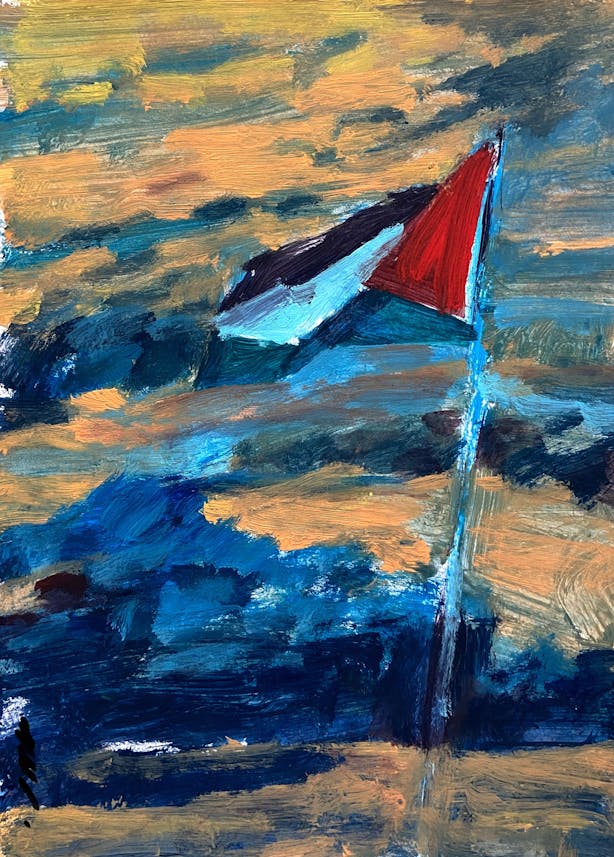
- Writing Gaza
Writing Gaza
Omar Berrada & Shivangi Mariam Raj
Written during Israel’s mass destruction of civilian infrastructure in Gaza, Hanan Habashi considers the place of the home as a site of ‘generous togetherness’.
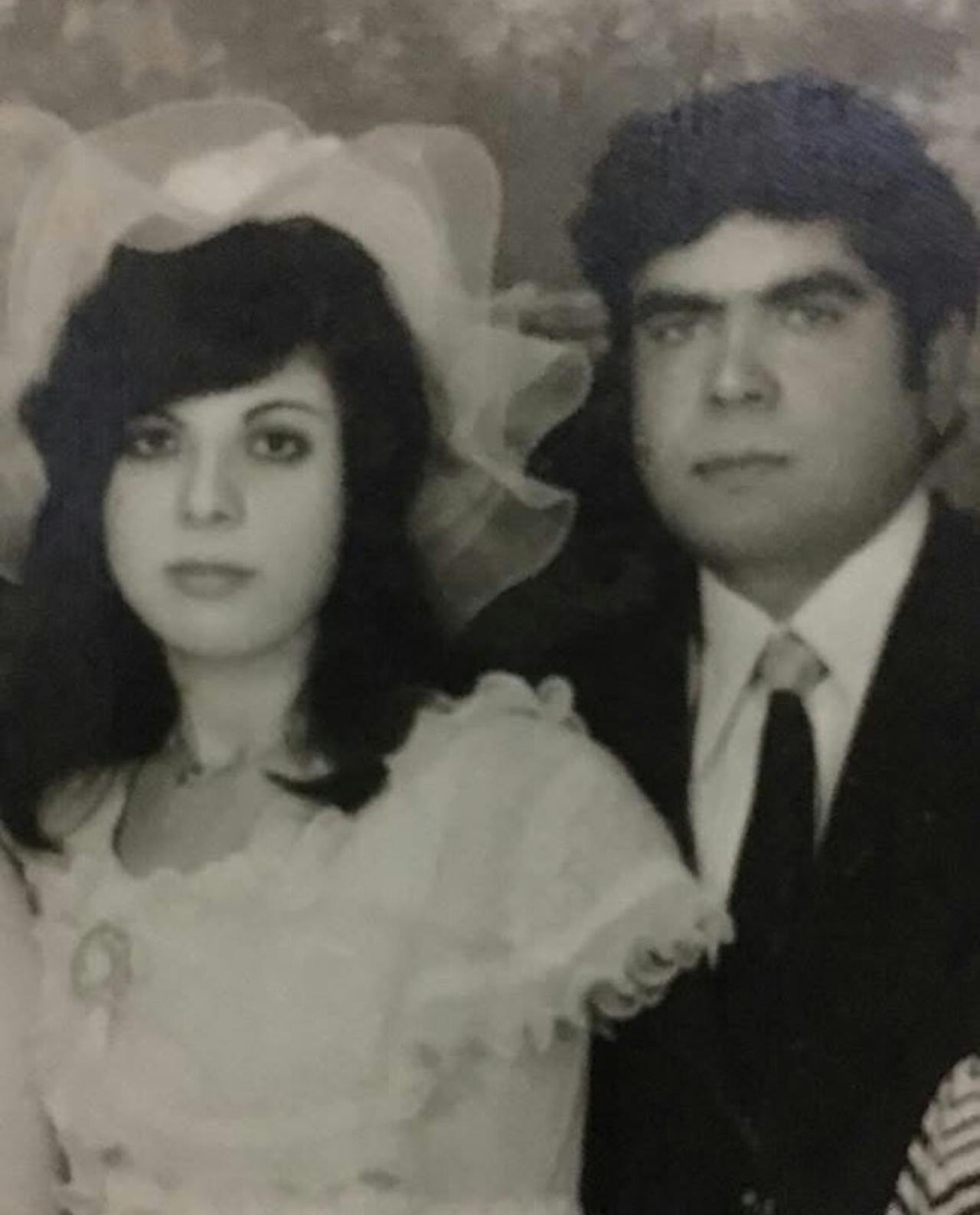
The house begins here. A studio portrait of my parents on their wedding day, Gaza, 1977.
Do our houses know a ritual for dying? Do they lock their ribs against the blast or kneel and cover our memories with their bodies? Do they cast our stories upwards like prayers, or do they wrap them close as they fall down?
They sent barrels of fire and death to kill our house. They killed it. The house is gone. What remains are colourless ruins that once smelled like cardamom and sugar, that once looked like a universe of jasmine and light. It was never only a house. It was a grammar of living, a school of dignity that was not announced but practised until it became instinct.
My grandfather built our 80-year-old house with a back garden wider than the rooms inside, as if to say that life is only meaningful when it spills outwards. The back garden was his invitation to the neighbourhood. There was always plenty of room. Room for extra chairs stitched edge to edge, for cousins racing through lantern light, for strangers who never left as strangers.
The kitchen, my grandmother’s sanctuary, was never still. It is where I first met love’s generous presence. It always hummed with her cooking. The air held cumin and cinnamon, onions surrendering to olive oil, and steam fogging the windows before drifting outside. Even the peeling of an orange, waiting patiently for flavours to meet each other, was a lesson of love and patience. She loosened the skin slowly, so the citrus mist travelled to every face nearby. Waiting for broth to thicken was not a delay but a discipline. Flavour had its own eternity, and we were asked to keep time with it. In that kitchen, love could be inhaled.
Inside, the dining table practised its own poetics. Long, heavy, and patient, and it kept finding a way to fit one more plate, one more hand. Food was not so much placed as offered. Warm dishes arrived like gifts. Around that table, we learned the essentials of belonging to a place. We learned how to be in each other’s lives. Wait for the eldest. Pass the best portion to the one who never asked for it. Notice whose hand was empty. Hunger, in that house, was an alien idea.
Friday mornings gave that love another name. My grandfather made coffee for every family in the building. Cardamom in the grinder. Coffee beans kept in a tin with a stubborn lid. Butterscotch candy on a small plate for sweetness after the bitterness. It was my job to carry the thermos to him. It was one small task that felt like a title. Baba and I did not trade many words, but we both loved coffee. And that was not nothing. Drinking a small cup with him was how I learned to love with reverence. Later, when I brewed it myself, I carried both men in every pour. Coffee, too, was a ritual that asked you to serve another before you served yourself, to measure care by heat and patience.
And if the kitchen taught patience and generosity, the mornings taught presence. Before the light touched the walls, Baba would turn the car on to go pray Fajr. One cough, then a steady hum. A door closed softly. Then another sound would always follow: water. My grandfather would wake up as early to open the hoses and wait for the trees to answer. He moved from guava to mango, from lemons (so many lemons) to almonds, from roses to the little flowers we called ‘tom-es-samaka’. Birds stitched light into sound. Two worlds tried to begin at once, and our house taught us how to stand between them: with patience, with care, with love in our hands.
This was ‘tarbiya’ without speech. Begin by watering what will feed others. Approach the day gently, leaf by leaf.
This is how the house raised us. It planted us into a thousand small obediences to love.
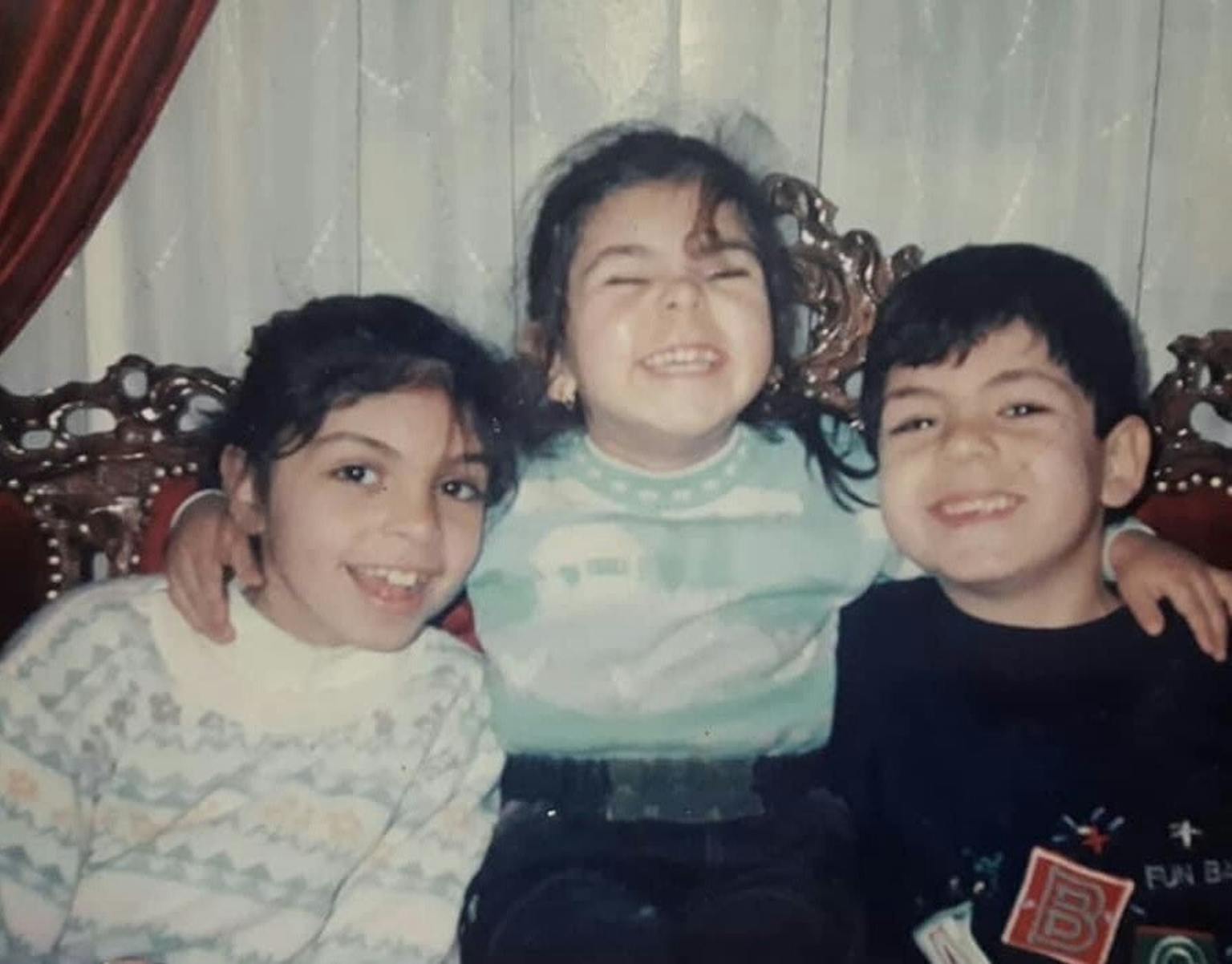
The house as our first world. A photograph of my two siblings and me in the room that held our laughter, Gaza, 1994.
If life ever stole us away, Thursday evenings pulled us back without being asked. Children would run sticky-fingered under the guava tree. Elders sat beneath the lemon tree’s glossy leaves and threaded memory into the present. Stories travelled the back garden like trays. So many trays and stories.
Dignity lived in the way you lifted a chair for an older body. In the way your aunt presses fruit into a palm already full. In the quiet agreement that we would sit at the same table even when we did not share the same mood. The house kept reminding us that life is communal, or it is not life at all.
But every house in Gaza had to learn the ache of thinning. Displacement began before the rubble. The house lost us before we lost it.
Our house did not simply empty. It was a slow unbraiding of place from body. It is how saying ‘home’ begins to snag on the tongue like clumsy threads catching on a nail.
This is a genocide of memories, I keep saying. This is domicide. It is the deliberate un-housing of a people. The targeting of courtyards, balconies, stairwells, and trees because they bind us to one another. To blow up a house is to try to un-teach a language. Addresses are deleted. Thresholds unmade. Courtyards go silent. They are not only killing people; they are trying to kill the places that teach us how to be people together.
When a house was demolished at the beginning of the genocide, we said the sentence we were taught to say: ‘At least the people of the house are alive,’ as if to say that safety is a treasure, lives over walls. Almost two years on, we know what that sentence cannot carry. A house cannot be compensated. The house is dignity. The house is the archive where the ones we lost left their traces. To kill a house is not only to break stone; it is to undo the stitches that make us a ‘we’.
They killed the stairwells lined with children’s sandals, kicked off before running inside. They killed the windows that opened wide to let in the sea breeze and the sound of the adhan. They killed the rooftops where water tanks baked under the sun and cousins gathered to fly kites. They killed the courtyards where weddings erupted into dance long after midnight, and where, days later, the same courtyards absorbed the sobs of mourning.
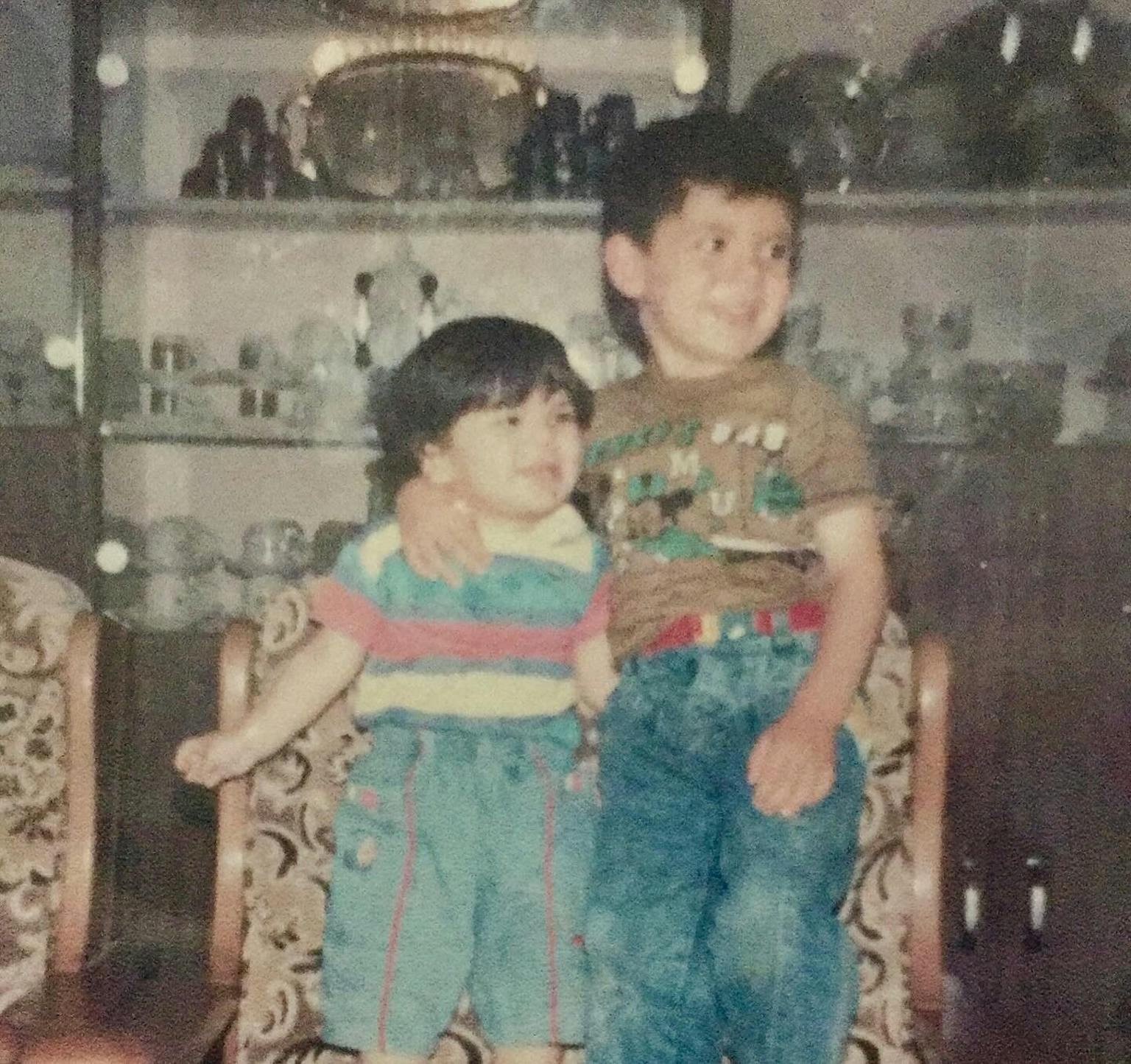
My late older brother and me: the cabinet behind us is filled with the wedding plates that served a lifetime of Thursdays, Gaza, ca. 1992.
Don’t you lose a friend when you begin to believe in different truths? You hold one, they hold another, and suddenly you are no longer walking side by side. The bond stretches until it snaps. Friendship, like a house, rests on common ground. A house is a truth we return to. It shelters us, opens its rooms to us, and gives more than it shows. Inside it, we know how to move, how to belong, how to feel whole, and how to live in one another’s lives. When that house is destroyed, there is no longer a place to return to. The rooms vanish, the roof falls, and everyone is cast out. What was once a shelter becomes a wound. We are pushed from homefulness into homelessness. Each one of us is left to search for scattered pieces of truth, wandering among ruins, trying to rebuild meaning out of what no longer stands. And who are we to survive these massacres?
This is how the social fabric is attacked. When shared truths dissolve, when the houses we lived in together are torn down, we are left scattered. Beliefs separate us as surely as collapsed stones, and in their absence we must face the loneliness of truths that no longer hold us together.
Another violence this forced displacement tried to press into us is minimalism. Not the aesthetic, but the kind forced into your hands in a plastic bag. You no longer have anything extra. No extra chairs stacked for friends who might still come. Or extra plates waiting for the late arrival. Or extra mattresses and blankets for the unannounced guests who are always welcome. In our house, abundance was an ethic. But this forced minimalism is a violent, colonial policy. It cuts life down to survival and rations our abundant existence.
If domicide tears down the walls, this shrinking tries to finish the lesson inside us.
You leave a world of abundance and run with your survival. One blanket, one pot, one spoon. You place yourself in a tent sized to fit bodies, not gatherings. Your cabinets that housed photo albums and old postcards are turned into firewood. Tables are dismissed as luxury. We are forced to shrink against the idea of a house.
But if a domicide tries to undo our generous togetherness, each small, home-ful act we repeat is a stitch.
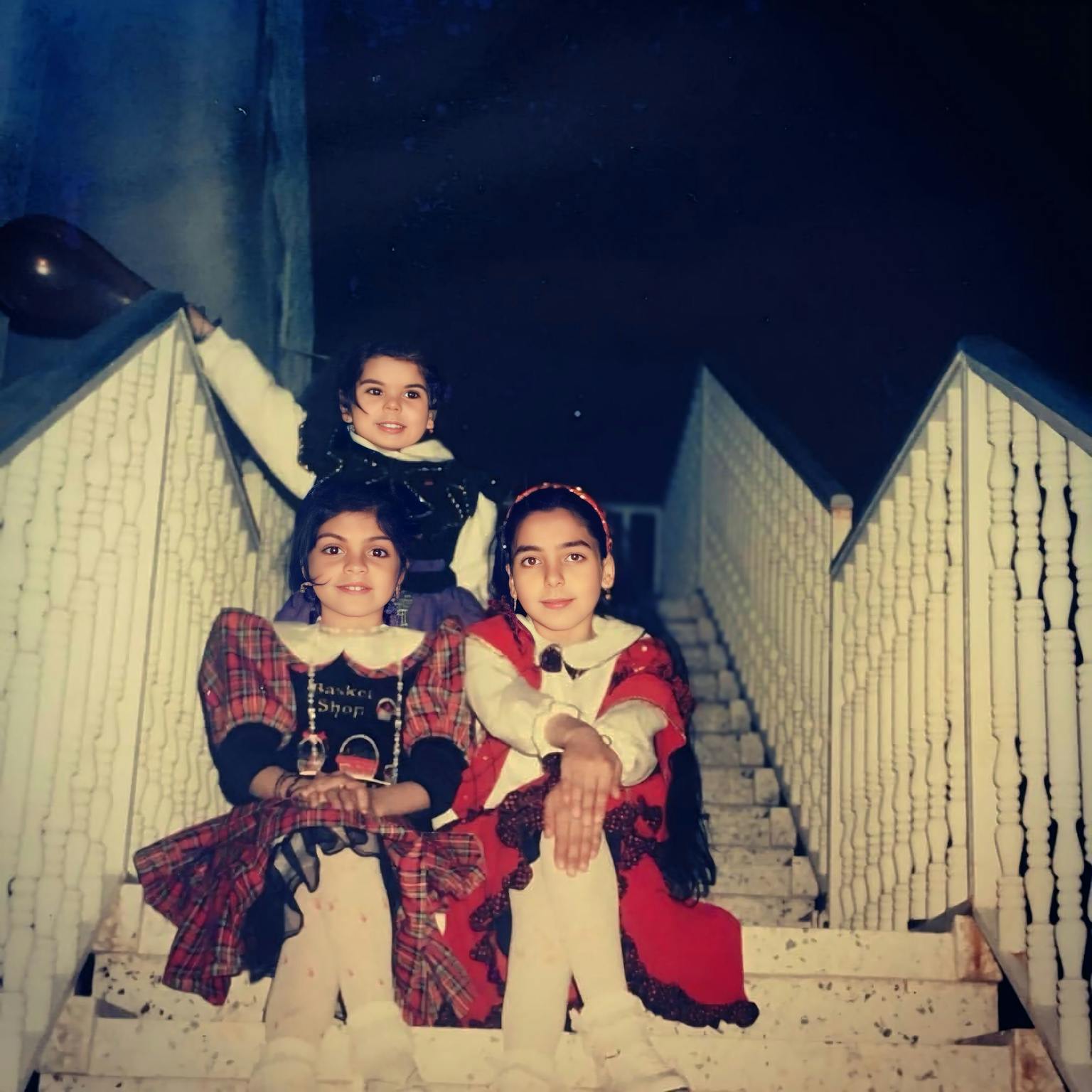
On our staircase: maximal dresses, maximal joy. With my sisters, Gaza, ca. 1994.

Omar Berrada & Shivangi Mariam Raj

Elisa Adami
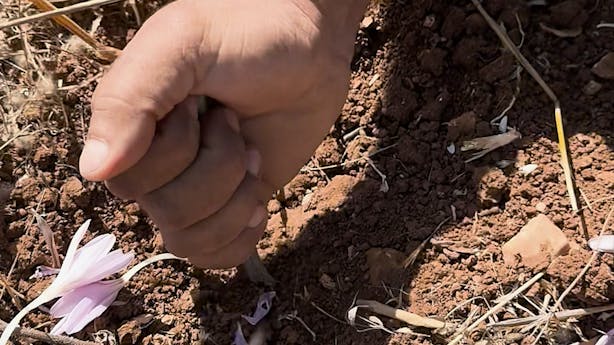
Adam Rouhana & Juline Hadaya